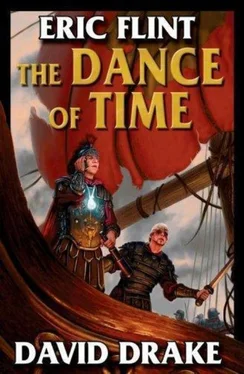Eric Flint - The Dance of Time
Здесь есть возможность читать онлайн «Eric Flint - The Dance of Time» весь текст электронной книги совершенно бесплатно (целиком полную версию без сокращений). В некоторых случаях можно слушать аудио, скачать через торрент в формате fb2 и присутствует краткое содержание. Жанр: Альтернативная история, на английском языке. Описание произведения, (предисловие) а так же отзывы посетителей доступны на портале библиотеки ЛибКат.
- Название:The Dance of Time
- Автор:
- Жанр:
- Год:неизвестен
- ISBN:нет данных
- Рейтинг книги:4 / 5. Голосов: 1
-
Избранное:Добавить в избранное
- Отзывы:
-
Ваша оценка:
- 80
- 1
- 2
- 3
- 4
- 5
The Dance of Time: краткое содержание, описание и аннотация
Предлагаем к чтению аннотацию, описание, краткое содержание или предисловие (зависит от того, что написал сам автор книги «The Dance of Time»). Если вы не нашли необходимую информацию о книге — напишите в комментариях, мы постараемся отыскать её.
The Dance of Time — читать онлайн бесплатно полную книгу (весь текст) целиком
Ниже представлен текст книги, разбитый по страницам. Система сохранения места последней прочитанной страницы, позволяет с удобством читать онлайн бесплатно книгу «The Dance of Time», без необходимости каждый раз заново искать на чём Вы остановились. Поставьте закладку, и сможете в любой момент перейти на страницу, на которой закончили чтение.
Интервал:
Закладка:
Their postures were quite similar. Except that Valentinian, naturally, held his sword in his hand.
"Anybody bothers the general, he's fucking dead."
Damodara heard the mutter. He said quietly to the officer: "Best position a number of soldiers around the square. Some beggar or dimwit might wander by. And, ah, the Mongoose is not joking."
Near sundown, Belisarius emerged from his half-trance. Jerking his head a little, he looked first to the right, then to the left, and then over his shoulder.
Seeing Sanga, his lips twisted. The expression bore no resemblance, really, to the crooked smile the Rajput king remembered. But he was still glad to see it.
"I need to speak to the emperor," Belisarius said, "but I don't want to miss the sunset. Not this one. Ask him if he'd be willing to meet me here."
"Of course." Sanga was striding up the steps a moment later, taking them two at a time with his long legs.
Not five minutes later, Damodara emerged from the palace, with Sanga at his side. When he came up to the bench, Belisarius shifted over, leaving room for the emperor.
"Sit, please, if you would. I realize a dozen courtiers will drop dead from shock at the sight."
Smiling, Damodara sat. "No such great fortune, I fear. But perhaps a few might be struck dumb, for a time."
They sat silently, for a moment, both looking at the sunset. By now, the sun was below the rooftops.
"I am sorry, Belisarius."
"Yes."
Silence, again, for a few minutes. Then Belisarius shook his head.
"Life goes on. As amazing as that seems, sometimes."
The emperor said nothing. Just nodded.
"As I recall, the quarrel was over where to hold the peace conference."
"Yes," said Damodara. "I proposed holding it here, but-"
"No, that won't work. Rao might be willing to come, but Shakuntala would have him chained and shackled. She has no great trust-yet, anyway-for any Malwa."
Damodara chuckled. "That was the gist of it. The young empress of Andhra expressed herself, ah, with more youthful vigor."
"Hold it in Bharakuccha. It's closer to neutral ground than any other. And have the new medical orders organize and manage the thing."
"Bharakuccha. ." Damodara considered the proposition. "Yes, that makes sense. But will the medical orders be ready for such a task, on so little notice?"
"My wife Antonina's already there, and she's still officially the head of the Hospitalers. Anna Saronites can get there quickly-trust me on that-and Bindusara is not far away. Meaning no offense, Your Majesty, but I think the three of them can manage the business considerably better than a pack of courtiers and officials."
"Well. True. Good idea, Belisarius."
Belisarius pinched his eyes. "I got it from Aide, actually. Just yesterday."
But when he looked up, there was only a hint of moisture in the eyes. "There is also-always-the memory of angels," he said quietly.
He seemed to be speaking to himself, more than to the emperor. "And what else are we, really, than memories? It took me all afternoon to understand. He came here so that he could have memories also. And, having gained them-fought for them, and won them-he left them behind for me. For all of us."
"I will have a monument erected to the Talisman of God," said Damodara.
"Make it a small one. Not ostentatious. A place for quiet meditation, not pomp and parades. I know a good place for it. A sal grove between the Ganges and the Yamuna, where an Armenian soldier already rests. He and Aide would both like that, I think."
He smiled, finally. "And make sure it's well kept-up, please. He disliked messiness."
Chapter 42
Kausambi
Summer, 534 AD
Thankfully, all things considered, the next few weeks were so hectic that Belisarius never had much chance to brood on Aide's death. While he could rely on Antonina and Anna and Bindusara to organize the peace conference in Bharakuccha, he-along with Damodara, of course-had the more pressing task of ensuring that the cease-fire was not violated.
Not too badly, at least. There were some incidents, inevitably. The worst was a clash between the Amaravati garrison and Deccan irregulars that almost assumed the proportions of a running battle. That happened in the course of the garrison's march back to the Ganges plain. The garrison was big, its supply train was poorly organized, its commander was another of the many imperial cousins who'd been selected by Skandagupta for his political connections rather than his military skill, and the soldiers of the garrison were still accustomed to the old Malwa ways of handling local populations.
None of the Andhran peoples-certainly not the Marathas-were in any mood to tolerate Malwa atrocities any longer, even on a small scale. So, after a few episodes, the countryside erupted. Within days, the retreating garrison was being subjected to daily ambushes. Rao announced he would intercept them with the regular Andhran army; and, in a perhaps indelicate phrase-transmitted by both radio and telegraph-predicted that the Deccan's carrion-eaters would soon be too fat to run or fly.
Coming from someone else, that might have been taken for mere bluster. But the day after making the announcement, Rao led his army out of their camps on a march up the Narmada. No leisurely march, this; at the pace he maintained, he would indeed intercept the Amaravati garrison long before they could reach the safety of the Vindhyas.
Between them, Belisarius and Damodara managed to defuse the situation before it could become a full-blown crisis. Belisarius, by cajoling Shakuntala over the telegraph lines-not hesitating to use the low tactic of reminding her how much Andhra owed him personally-and Damodara by the still simpler expedient of ordering the garrison to alter its route of march and return via the east coast.
That took the garrison out of Andhran territory altogether, which Rao grudgingly allowed was an acceptable solution. He also, however, predicted that the garrison would continue its depredations as it marched.
Which it did. Indeed, it behaved more badly still. The garrison was in Orissa now, whose population lacked the ferocity and martial traditions of the Marathas. With a commander who sullenly ignored most of Damodara's commands-erratically transmitted, in any event, since the telegraph network in Orissa was primitive-and a soldiery taking out its anger at Maratha harassment on defenseless Orissans, the march degenerated into an orgy of plunder and rapine.
It all came to an end in Bhubaneshwar. When the garrison reached the ancient city, the former capital of both the Kalinga and Chedi dynasties, they discovered that both Rana Sanga and Toramana had already arrived.
With ten thousand Rajputs, as many Ye-tai, and an artillery train. After hesitating for a day, the garrison's commander decided that obeying Sanga's instructions that he relinquish command was a wise idea.
It wasn't, although the outcome would have been no different if he'd tried to put up a fight.
Damodara had decided that an object lesson was needed. So, following his explicit instructions, after the garrison surrendered-no other term could really be used-Sanga and Toramana executed the commander of the garrison and every officer on his staff. Then, they executed every third surviving officer, chosen at random. Then, lined up the entire garrison-now disarmed, of course-and executed one soldier out of ten.
Then-Damodara was in a rare fury-conscripted every man who survived into forced labor battalions. In a few years, the emperor announced, he might-or might not-grant them their liberty.
He got that suggestion, along with the decimation, from Valentinian. An unsolicited suggestion, to boot, which made the courtiers quite indignant. They did not, however, voice their opinion aloud. They were discovering that while being in Damodara's service was generally far less risky than being in Skandagupta's had been, it did not lack its own moments of anxiety.
Читать дальшеИнтервал:
Закладка:
Похожие книги на «The Dance of Time»
Представляем Вашему вниманию похожие книги на «The Dance of Time» списком для выбора. Мы отобрали схожую по названию и смыслу литературу в надежде предоставить читателям больше вариантов отыскать новые, интересные, ещё непрочитанные произведения.
Обсуждение, отзывы о книге «The Dance of Time» и просто собственные мнения читателей. Оставьте ваши комментарии, напишите, что Вы думаете о произведении, его смысле или главных героях. Укажите что конкретно понравилось, а что нет, и почему Вы так считаете.











